In the last few days I’ve been doing a lot of stuff: biking, organizing a Memorial Day dinner, preparing for a week-long trip to the East Coast, thinking about the craft and design of workshops. (These are the expert workshops that I organize all over the place.)
In many ways these are very different activities, but I really enjoy them all. I recently realized that despite their differences, they actually share a few qualities.
1) They’re active, embodied knowledge.
Obviously bicycling is physical, but cooking is a nice combination of fine motor skill and lifting big heavy things (or in my case, avoiding setting myself on fire); you’re always on your feet in a workshop; and travel is pretty physically strenuous, for good and bad reasons. Maybe I’m getting older, I’m less of a couch potato, or my ADD is increasing (and I know these are somewhat mutually exclusive explanations), but I find my patience with sitting for long hours and just reading is decreasing. I can do it, but I’m happier engaging my body. And nothing is better than activities where you’re involving your body, but you have to think about what you’re doing. (Gregg Zachary had a great piece last year on the rediscovery of the virtues of manual work. I’m part of a movement.)
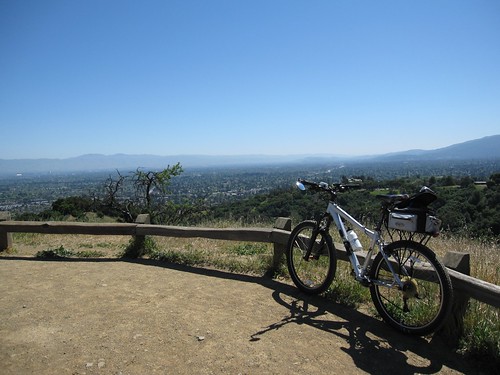
cycling hunter’s point, via flickr
Like Richard Sennett’s craftsman (and I really recommend his book), I enjoy things that are physical or tangible, but also engage the mind. Thoughtful action is where it’s at.
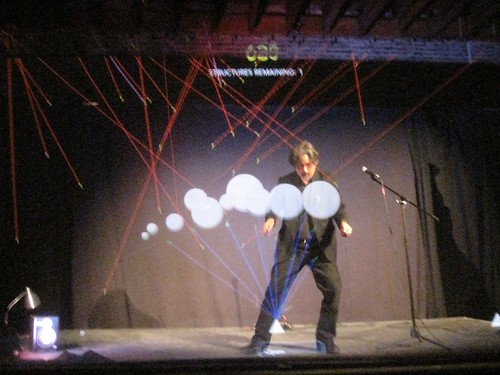
gestural interface missile command, via flickr
2) There are real deadlines.
My capacity for finishing things that have open-ended deadlines, or fake deadlines (“so we all agree that we’ll finish our tasks by next week, right? right?”), is plummeting to near zero. I have too much other stuff in my life that absolutely has to get done.
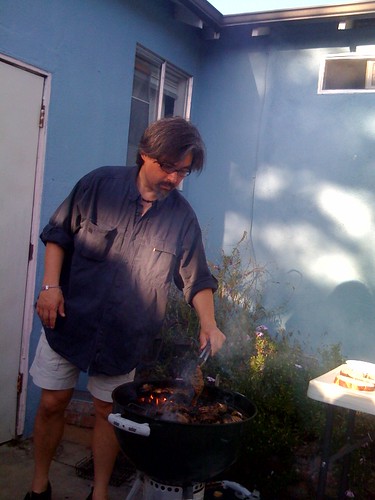
hard deadlines: flames don’t wait, via flickr
So hard deadlines are good for me now. Essential even. The workshop starts at exactly this time, the plane leaves at exactly that time, the guests are arriving now.
Hard deadlines also put a nice bound on craftwork, by preventing you from tinkering forever with something. A paragraph could always be better, but as Sennett writes, the demands of the trade force craftsmen to accept limits, to do the best job they can within the time they have, and to learn to be satisfied with that. As graphic designers say, “Finished is Good.”
3) They require preparation.
The day of the cookout, I spent hours chopping vegetables, checking marinades, cleaning off platters (you can never have too many platters at a BBQ), locating plates and cups, setting up staging areas for food and drinks, laying out tools, etc. (I noticed, though, that this wasn’t tedious, it was pleasant. It was a classic example of what Csíkszentmihályi calls flow.)
Likewise, when you travel, you’ve got to think a lot about what to pack, how to structure your time, how to get among different places, etc.. A bike won’t work with a flat tire, nor will a cyclist work if he’s dehydrated, so you’d better be prepared for those possibilities. Every ride requires some kind of adjustment: technical climbs mess up gears; thorns flatten tires; I get hungry. Having the resources to deal with those things lets me keep riding.
With workshops, you have to think in advance about everything, and I mean everything: you have to go over the agenda minute-by-minute, think about the flow of the day, tinker with questions and exercises to eliminate ambiguity and focus people, lay out materials, move the furniture around, make sure the caterers know when to appear, etc., etc. (Indeed, there are things that we normally don’t think about that I’d like to start experimenting with, like lighting and ambient sound, making some activities more embodied and physical– sitting is exhausting– and playing with the day’s menu to keep people from getting weighed down by muffins and too much coffee.)
Good preparation doesn’t require you to think just about one thing. It requires you to think about a lot of different things, big and small; to think about timing and process; about division of labor; about contingencies and strategies. That’s part of what makes it pleasant.

future of science workshop, malaysia, via flickr
But here’s the important thing.
Some of that preparation is meant to help you keep things on track, and do things exactly the right way. But most serious preparation isn’t about scripting. Rather, its about making it possible for you to adapt to whatever actually happens. I’ve never had a workshop run exactly the way I imagined it would: more people show up, they turn out to be interested in other things than we’d discussed before, the room isn’t laid out the way we expected– a thousand different things can go akimbo.
I used to think that the point of planning workshops in such great detail was so I’d have more control over them. Wrong. You never have control. You have whatever you have when you get in the room. The point of doing all that planning is to deeply understand the intentionality and philosophy behind the workshop, so you can improvise your way to the same end-point, and you have the tools at hand to do so.
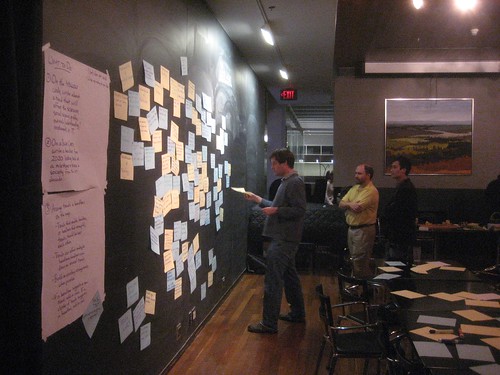
perimeter institute, waterloo, via flickr
[Update: I’ve realized that this is my complaint about humanities graduate training: it socializes you to believe that you possess skills that are useful only in a very specific future– namely tenure track jobs in your field– and train you to believe that you’re less qualified to succeed at a different future, and that any other future is a failure.]
If you know that you’re going to go off the map– if events are going to conspire to send you in another direction, and they will– the best that you can do is have the right gear, and a clear picture of where you want to go.
4) They have serendipity.
The upside of plans not working out the way you expect is that they can work out better. Sometimes the very coolest thing isn’t on the map, and the only way to find it is to venture into the unknown.
One of the great pleasures of having a big party is that mixing up friends who don’t know each other can have pleasant results for everyone. The best rides are ones that have a brilliant hill and view that you didn’t know about. The best trips are the ones that expose you to something you’ve never seen before, or didn’t even know was cool. I fell in love with Budapest not because I’d always wanted to go there, but because it’s an amazing, complicated, Old World post-socialist place that I find alternately fascinating and frustrating. I love London because it rewards walking: I know it well enough to be able to navigate by Tube or on foot, but every time I go out in the evening I discover something— a little square, a park, a row of businesses– that charms and captivates, and that I’d never heard of.
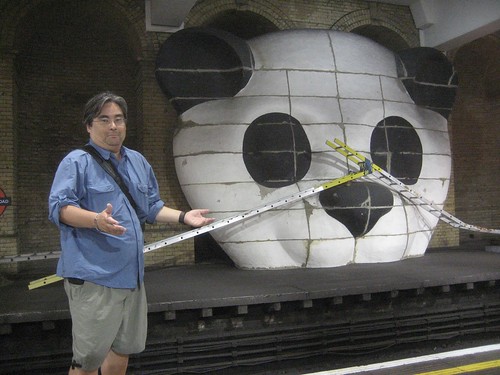
surprise in the london underground, via flickr
Workshops have serendipity too. Tons of it. You want to build connections between ideas or fields that even experts hadn’t seen before, or explore the cross-impact of trends that people normally think about separately. When that works, the results are awesome– and the amazing thing is, the results are awesome a lot more often than you’d expect. You never know what the outcome of a workshop is going to be– and if you do, there’s really no point in having it in the first place. This doesn’t mean that a workshop shouldn’t have certain goals or deliverables; far from it. But it’s like an evening walk in London: you know where you’re going to end up, you know that there are certain landmarks you’ll pass, but you don’t know what else you’re going to see along the way. Your job is to be open to the serendipity, so you can take advantage of it.
5) They draw out people.
I mean this in two senses. First, they can push you do things you didn’t know you could. Good rides challenge you to do things you didn’t think you were capable of, or leave you exhausted by happy with your performance.
Second, they open up a space for people to contribute. My wife used the cookout as an opportunity to repot a bunch of flowers in the backyard, dig out and repot some aging bamboo, and do other things on her gardening/home improvement list. Once kids started arriving, my daughter made (or taught the kids how make) balloon swords, which they then played with all evening. I hadn’t thought of either of these, but people commented on how nice the backyard looked, and the kids all left exhausted and uninjured. Win.
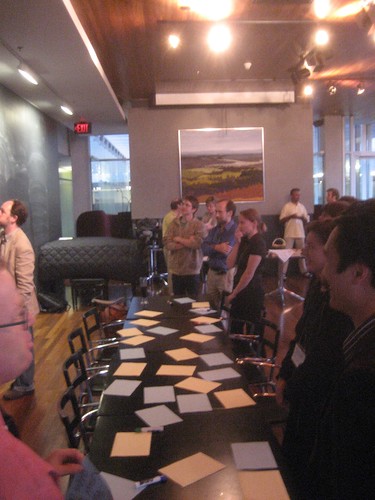
perimeter institute, waterloo, via flickr
Workshops require both kinds of drawing out. Running a workshop isn’t an exercise in controlling other people, but it’s a hard task to create a venue in which everyone can think seriously, think differently, and think together.
It’s also not about getting a certain result, but about creating the conditions out of which interesting new things will emerge. Of course, workshops have objectives, but as a facilitator, you have to approach them obliquely, and recognize that the actual work and thinking will be done by participants: you’re just (“just” isn’t quite the right word!) there to help make it happen.
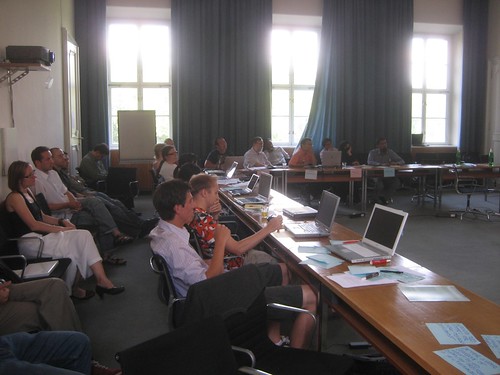
workshop in laxenburg, astria via flickr
6) Sometimes you can push, but mainly you have to flow.
You can challenge people, but you can’t order them to be innovative. You can try to get guests to mingle or introduce them to each other, but you can’t make them be chatty and friendly. You can also push yourself, but you must recognize that pushing doesn’t get you everything: you can get to the airport on time, but you can’t control the weather and need to be able to go with whatever the situation presents.
my son on a happier ride
This morning I got an unexpected lesson on pushing versus flow from my son. We were biking to school, and he has the habit of standing up while pedaling. I can’t get him to stop (he’s seven, after all), so I was trying to teach him how to do it in a way that maintains his balance. He got frustrated and mad, which made him distracted; and so he took a spill. Bad enough to break the mirror on his bike, add a couple nicks to the brakes or handlebars, and require some ice and band-aids when he got to school. Fortunately nothing on him was broken, and he’ll be fine.
As I try to tell the kids, biking is one of those things that demands mindfulness: you have to watch the road, know what gear you’re in, know where the cars are, know how tired you are. You can push yourself, but if you lose your concentration– if you lose the flow– you’re likely to crash. In the course of pushing him, I made him lose what little flow he had.
Still, any spill that doesn’t send you to urgent care is a learning opportunity, not an accident. And as a friend of mine wrote after hearing about the crash,
But falling is an essential part of growth. It teaches you where the boundaries are. If you never push hard enough to fall, you will never know if you could grow twice as much or twice as fast– because you are playing it safe.
So across all these activities– and maybe across everything you do– hitting that mix of pushing and flow, planning but staying open to serendipty, and being active is key.